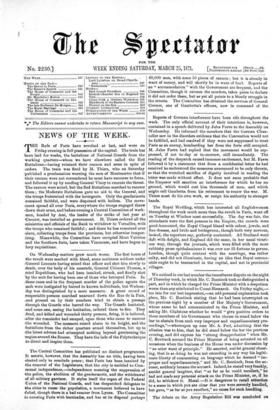We noticed in our last number the tumultuous dispute on
the night of Thursday week, in which Mr. C. Bentinck took so distinguished a part, and in which he charged the Prime Minister with a despotism worse than any attributed to Count Bismarck. On Friday night,— too late for our last impression,—an odd personal explanation took place, Mr. C. Bentinck stating that he had been interrupted on the previous night by a member of Her Majesty's Government, whose name he had communicated to the Prime Minister, and asking Mr. Gladstone whether he would " give positive orders to those members of his Government who choose to stand below the bar to abstain from such very improper and unparliamentary pro- ceedings,"—whereupon up rose Mr. A. Peel, admitting that the allusion was to him, that he did stand below the bar the previous evening, and did express his "strong disapprobation" when Mr. C. Bentinck accused the Prime Minister of being actuated on all occasions when the business of the House was under discussion by "an utter want of principle." He asserted, amidst general cheer- ing, that in so doing he was not exceeding in any way his legiti- mate liberty of commenting on language which he deemed " im- proper and unparliamentary," and Mr. C. Bentinck, from the ac- cuser, suddenly became the accused. Indeed,he stated very frankly, amidst general laughter, that " so far as he could recollect," he had not made any personal attack on the Prime Minister, or, if he
did, he withdrew it. Moral is dangerous to recall attention to a scene in which you are clear that you were severely handled, but gave, " as far as you recollect," no cause for such handling.


































